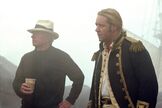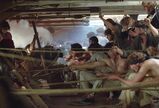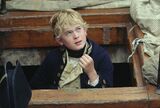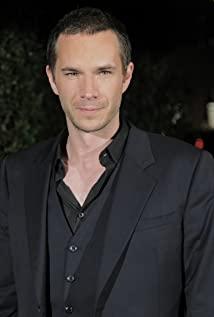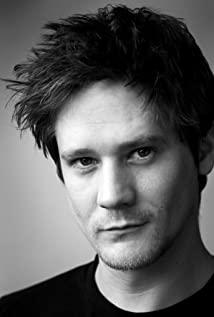It should be said that this is a film full of masculinity, the style is hard-boiled, the story has rules to follow, and the actors strive to present the appearance of a marine movie on the deck. In addition, the harsh nature of the natural environment - sometimes the wind and the waves and the whole sea standing still - works beautifully with the ups and downs of the story itself, and you won't get bored because there are breath-taking ocean chases with crew members friction and the inevitable tragic death, as well as the innate British sense of humour. The combination of these elements is so good that it is enough to watch it over and over again. That's not enough though, it needs a little pepper.
Pepper, presumably that mini-band.
In fact, the musical composition in this film is very simple and easy to understand: since we have a captain who can play the violin, his subject matter is represented by the violin; for the same reason, let the ship doctor and the cello equate . In the war itself, there are war drums; the crew members are from England, so they might as well play some folk songs with a rich island flavor. We also have an unpopular midshipman, so let him have a good voice and show his beautiful voice at the right time. There is a more specific reason for his unpopularity.
Among them, the two members of the mini-band are undoubtedly the most outstanding. They are like a few rosemary sprinkles in a pot of deliciously braised meat - bang! It was wonderful. Their first performance came after escaping the pursuit of the French devil ship and finding a chance to survive. The captain played the violin as the main melody, and the doctor played the cello to complement it. It should be said that their roles are like these two instruments: the eternal protagonist and the golden supporting role, who is always indispensable but rarely plays alone. This performance foreshadows the tone of the whole film: the captain is the absolute and only protagonist. Without him, the ship's doctor wouldn't be on board, the battleship would have been killed when it encountered the French enemy, and everyone on board would never have had a chance to regain the upper hand and take revenge -- all without this wonderful violin , it cannot be a music. And such a warship obviously can't accommodate too many musicians, there can be no women on board, and there is an arbitrary captain. If there is no cello that can hold him, can it still be worth it? So the ship's doctor bravely assumed the role: he and the captain's almost completely opposite physique and temperament reconciled each other, he hoped to reach the Galapagos with the ship, and was repeatedly disappointed when he was about to see the dawn of truth - this The auxiliary function of the line in the narrative is obvious to all. He may not be so important, but a glass of water without anything is just a glass of plain water that is beneficial but boring.
Then when it comes to the cello, it is impossible not to mention Bach. Bach's suites for unaccompanied cello are too well known to be said to be the most possible opportunity for this instrument to shine. In this film, Suite NO.1 for a cappella cello is naturally the first choice. As the ship doctor first prepares to disembark and when he actually sets foot in the Galapagos, the tune comes out naturally to show his cheerful mood and his ambitions as the protagonist ready to flex his muscles. It's just a pity that the tune was interrupted by war drums not long after it first appeared - after the French miraculously got around the ship, they were in crisis again. The second time, it was interrupted by a cheerful violin - the ship doctor found an enemy who was also hiding here at the other end of the Galapagos, and he had to inform the captain to catch up quickly.
However, the display of this kind of mood and the interspersed music theme are not limited to the ship doctor, but also happened to the captain. After the frail and indecisive midshipman was isolated by the crew, which eventually led to the midshipman's suicide, the always decisive captain stayed alone in the captain's room, and the violin music became very gentle, even a little sad for the first time. It seemed to imply that the captain was reflecting - after all, his mishandling had some weight in this suicide. It's just that this inappropriate mood quickly disappeared, just like the short-lived violin theme. When the doctor was wounded and nearly died, the reflection reappeared. The doctor's cello theme sounded beside the captain, and the direct result of this theme was the captain's first decision to dock the ship and approach the Galapagos, where the doctor was haunted by his dreams, instead of chasing the almost invisible French. After all, several crew members and non-commissioned officers have died because of his obsession, and he can no longer break his promise to bring the doctor on board, making it even more difficult for him to forgive.
Fortunately, the cello theme was quickly replaced by the brisk violin: they discovered the French, miraculously. And after that, they succeeded in revenge. Everything seemed to be so happy that the doctor who recovered from the injury could not swept away the haze of going to the island, and regained the mood to play the piano again, and cooperated with the captain to start the mini-band again. They didn't even use a bow this time, but plucked it with their fingers, which made the music even more cheerful and beautiful - the doctor just discovered a new species, and it's a shame that they haven't been able to bring back any more living samples, but it's still Very happy, and Darwin is far from this era. As for the captain, he paid a great price, some people died on his ship, and yet he captured the sword of the enemy captain, he defeated the French and thwarted a possible plot by Napoleon, what a joy. It's just that this joy is a kind of irony. After all, the whole film has never been so happy. It's too much like a dream. Then, they realized that the victory was really just an illusion, and the enemy captain was still alive. They had to catch up again, and set sail again with this cello and violin ensemble.
Of course, there is a lot of beautiful music in the film, such as the lively ballads of the sailors on the deck, which is tantamount to emphasizing their British identity. Another example is the sound of drums when the battle is approaching, which, together with the thick fog and sails on the sea, heralds the unknown life and death. There are many more, the music is not difficult, but together the effect is unexpectedly good, as if many people are speaking in different voices, together to form a beautiful Galapagos ensemble.
Great movie, isn't it?
-------------
Look again after the non-technical analysis.
View more about Master and Commander: The Far Side of the World reviews




